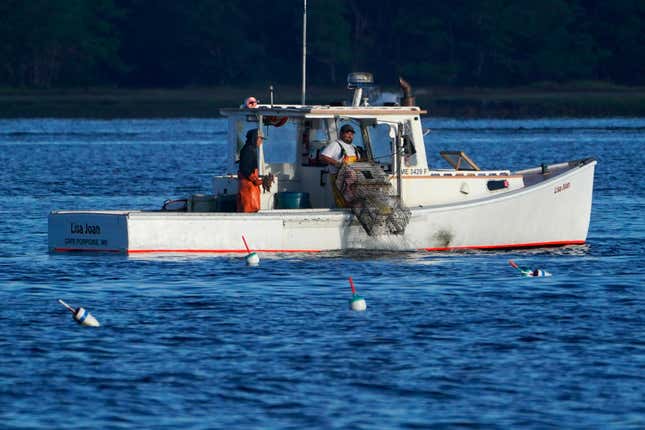
PORTLAND, Maine (AP) — A California court has dismissed a lawsuit from a group of fishermen against a conservation group that added New England lobster to its list of seafood to avoid.
The lawsuit stemmed from a decision by Seafood Watch, which rates the sustainability of different seafoods, to add American and Canadian lobster fisheries to its “red list” of species to avoid in 2022. The organization, based at Monterey Bay Aquarium in California, said lobster fishing poses risk to the North Atlantic right whale because of entanglement in fishing gear.
The fishermen, based in Massachusetts, sued last year, saying that the aquarium knew its action “would result in financial harm to plaintiffs and lobstermen like them.” But court papers filed last week in U.S. District Court for the Northern District of California state that all parties involved have agreed to dismiss the lawsuit.
“The dismissal is both a victory for the critically endangered right whale and for the free speech of those committed to protecting vulnerable species and preserving the ocean for future generations,” said Rebecca Kaufman, an attorney for the aquarium.
The fishermen had initially hoped to win a class action lawsuit and sought damages over $75,000. Attorneys for the fishermen did not return calls seeking comment on Tuesday.
The aquarium's red-listing also attracted another lawsuit from a coalition of Maine lobster industry groups last year. That lawsuit, filed in U.S. District Court for the District of Maine, is awaiting review by a judge, said Kevin Kelley, a spokesperson for the Maine Lobstermen's Association.
The red-listing resulted in some national retailers removing lobster products from their inventories. Thousands of businesses rely on Seafood Watch to make decisions about sustainability of seafood.
The U.S. lobster industry is based largely in Maine and Massachusetts and has experienced record profitability in recent years. The industry is also challenged by new rules designed to safeguard the vanishing right whales, which are protected under the Endangered Species Act.
The whales number less than 360 and they are vulnerable to entanglement in gear and collisions with large ships. The National Oceanic and Atmospheric Administration said last week that a right whale calf spotted off Florida suffered serious injuries consistent with a ship strike and will likely die.
"Every mom and calf is critical to the recovery of this endangered species," the agency said in a statement.